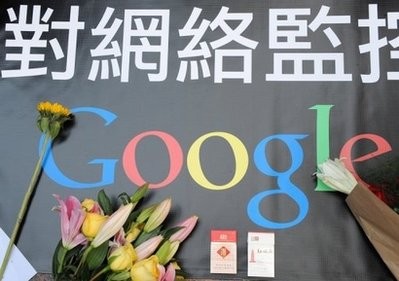Google stopped censoring search engine results in China in a move that drew anger from Beijing and leaves the Web giant facing an uncertain future in the world's biggest online market.
Google announced in a blog post that it had shifted mainland Chinese users of its Chinese-language search engine Google.cn to an uncensored site in the former British colony of Hong Kong.
"Users visiting Google.cn are now being redirected to Google.com.hk, where we are offering uncensored search in simplified Chinese, specifically designed for users in mainland China and delivered via our servers in Hong Kong," Google chief legal officer David Drummond said.
While ending censorship in China, the Mountain View, California-based Google said it planned to keep sales, research and development teams in the country of some 384 million Internet users. Chronology: Google's operations in China

Google's decision came a little more than two months after the Internet titan threatened to close its Chinese operations because of censorship and cyberattacks it said originated from China.
China reacted quickly to Google's move saying it was "totally wrong" for it to stop censorship and to blame Beijing for the cyberattacks that Google said targeted email accounts of Chinese human rights activists. Related article: Google 'thinks out of box', say activists
"Google has violated its written promise it made when entering the Chinese market by stopping filtering its searching service," said the official in charge of the Internet bureau of the State Council Information Office.
"We're uncompromisingly opposed to the politicization of commercial issues, and express our discontent and indignation to Google for its unreasonable accusations and conduct," the Chinese official said.
The White House said it was "disappointed" Google could not reach a deal with Beijing and reiterated that US President Barack Obama is "committed to Internet freedom and... opposed to censorship."
"The US-China relationship is mature enough to sustain differences," added National Security Council spokesman Mike Hammer.
Drummond, Google's top lawyer, said "figuring out how to make good on our promise to stop censoring search on Google.cn has been hard.
"We very much hope that the Chinese government respects our decision, though we are well aware that it could at any time block access to our services."
Google co-founder Sergey Brin told The New York Times that shifting the Chinese service to Hong Kong was not given a clear-cut stamp of approval by Beijing but "there was a sense that Hong Kong was the right step."
"There's a lot of lack of clarity," he said. "Our hope is that the newly begun Hong Kong service will continue to be available in mainland China."
"The story's not over yet," Brin added.
Drummond said "the Chinese government has been crystal clear throughout our discussions that self-censorship is a non-negotiable legal requirement."
He said providing uncensored search from Hong Kong is "entirely legal and will meaningfully increase access to information for people in China." Related article: Google China says 'business as usual'
Beijing tightly controls online content in a vast system dubbed the "Great Firewall of China," removing information it deems harmful such as pornography and violent content, but also politically sensitive material.
Google launched Google.cn in January 2006 after agreeing to censor websites for content banned under Chinese law. Google.cn is the second-largest search engine in China after Chinese search engine Baidu.com.
Google's decision to end censorship in China was welcomed by human rights and technology groups and members of the US Congress.
"It is a remarkable, and welcomed, action and an important boost of encouragement for millions of Chinese human rights activists and political and religious dissidents," said US Representative Christopher Smith, a Republican from New Jersey.
Arvind Ganesan, business and human rights director at Human Rights Watch, called it "an important step to challenge the Chinese government's use of censorship to maintain its control over its citizens."
"The onus is now on other major technology companies to take a firm stand against censorship," Ganesan said.
Sharon Hom, executive director of New York-based Human Rights in China, said Google was throwing the ball in the court of Beijing, which promised to respect freedoms in Hong Kong when it regained the territory in 1997.
"They are technically staying in China but stopping censorship," she said.
"Google has taken a courageous position against censorship," said Lucie Morillon of Paris-based media rights group Reporters Without Borders.
Leading Chinese dissident Wei Jingsheng, who spent nearly two decades in prison and now lives in the United States, said he knew China "would not back down."
"But we also knew that Google's motto was 'Don't be evil.' So there was no point on which to compromise," Wei said.
Leslie Harris, president of the Center for Democracy & Technology, praised what she called Google's "continued effort to enable China's people with unfiltered access to robust sources of information from all over the world."
























